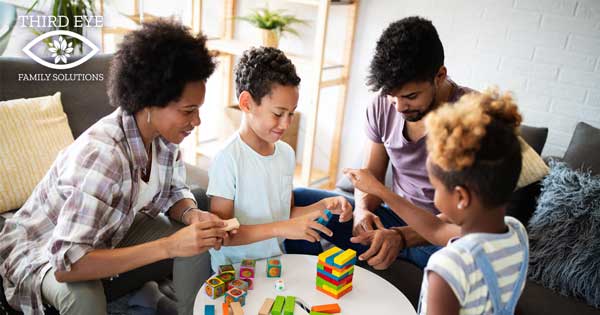The image of family counseling or coaching may bring to mind scenes from movies in which everyone is yelling at everyone else while a therapist tries to maintain order. In reality, family sessions look much different and are usually structured to include play and other activities that bring family members together.
Most family sessions are designed thoughtfully and in advance of the session itself. The age of the family members will be a guiding factor as to how the session is structured and what it includes. Sessions for families with young children will need to include movement, several activities, and plenty of flexibility, while sessions with teens and adult children may look more like a conversation with a mediator. Here are a few activities we may use in family sessions.
Cooperative Games
Not just for young children, cooperative games can teach us a lot about how a family works together. Even simple games like working together to keep balloons off the floor require cooperation and communication. Debriefing after games allows family members to recognize their strengths and notice their struggles. Did one family member get left out? Did someone get too competitive and push others out of the way? What did we do well, and where can we improve? Answers to these questions give the counselor insights into the family’s strengths and weaknesses.
Competitive Games
Friendly competition can be a lot of fun in a family setting. A favorite game is “Cotton Ball Wars” in which the family is divided into two groups and each is given an equal number of cotton balls. At a signal, each team throws their cotton balls to the other side, with the aim of having the fewest left on their own side when time runs out. Repeating these games several times with different teams (parents vs kids, older vs younger kids, more even division, etc) highlights various dynamics of the ways families work together. The chance to throw things at a parent with no negative consequence can also be therapeutic!
Connecting Activities
Many connecting activities are similar to the ice-breakers and team building activities that you see in educational and corporate settings. These can look like having each person write something nice about each family member, which the counselor then reads aloud. Other ideas include sharing positive memories with one another, listing the strengths of each family member, and sharing dreams for the future.
Family Timelines
Family history shapes us all, and creating a timeline of the family can be an insightful way to find out what events shaped each person’s life. Defining the beginning of a family alone can be helpful for children, who begin to realize that their family existed before they did. Interesting conversations often occur as one family member talks about an event that was important to them but perhaps was overlooked or forgotten by others. Timelines give each person an opportunity to express their unique perspective.
Talking Circles
Sometimes the most important activity in a family session is an opportunity to talk without distraction. Setting ground rules such as speaking in turn, using I-statements, or countering each negative with a positive ensure that the conversations don’t become the movie version of family therapy. The coach or counselor helps to keep everyone on track and ensure the ground rules are being respected. They also ask questions and ask for feedback and responses from those who are the subject of the conversation.
These are only a few of the ways that a family session can be structured. Our counselors have many ideas and activities that we use with families, and we would love to share them with you! If family counseling or coaching seems like a good fit for you, use our booking tool to schedule a free consultation today.


Recent Comments